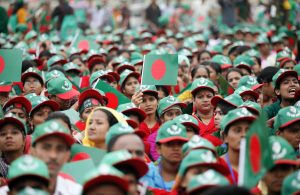When Bangladesh emerged as an independent state after experiencing a genocide in 1971, it drew little international attention; for decades it made it into the news cycle for natural disasters, poverty, military coups, political violence, and corruption. In the initial years of its existence the country was described as an international “basket case” and a test case for development. But as it celebrates its 50th anniversary in March, Bangladesh can hardly be ignored, thanks to the growing geopolitical significance of the country at a time when South Asia has become the site of rivalry between aspirant global hegemon China and regional power India. Bangladesh also warrants attention because of its remarkable economic growth in the past few decades, and successes in social indicators – often eclipsing its neighbors.
But these positive developments are marred with ongoing democratic backsliding characterized by repeatedly rigged elections, dwindling freedom of speech, and a growing penchant for authoritarianism in the government. Although the democratic aspirations of the people of then-East Pakistan led to the war of independence and the founding of the country with a promise of equality, human dignity, and social justice enshrined in the declaration of independence, the reality of the past five decades has been far from those ideals.
Instead of democratic institutional building, prolonged military rule and acrimony between two major parties – the Bangladesh Awami League and the Bangladesh Nationalist Party – have hindered sustainable growth and prevented the country from achieving its full potential. The salience of religion in politics, due to the expedient politics of the major political parties, a search for moral legitimacy by those who want to cling on to power, and the social changes experienced by the nation, cannot be disregarded.
Bangladesh is often called an India-locked country; a victim of geography, it is surrounded by India on three sides. It also has a small border with Myanmar. Due to its geographical position, squeezed between India and Myanmar, and nominal size, it is often considered a small country with little or no policy importance. However, this lack of significance is surprising as the geographical location of Bangladesh offers myriad possibilities. With practical and independent foreign policy initiatives, its location, especially the southward opening to the Bay of Bengal and proximity to a rising global power – China – could make Bangladesh the hub of the Indo-Pacific economic corridor. The country could be a node connecting Central and South Asia to Southeast Asia and China.

































